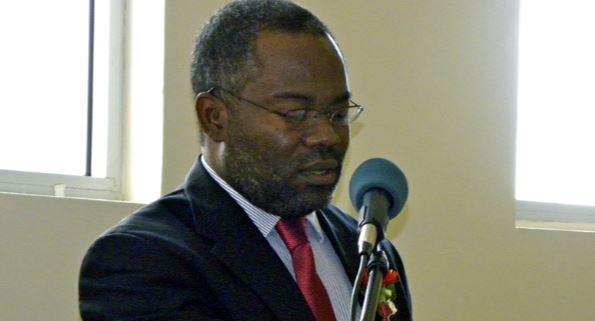
Last week, the first part of this column treated the submission by Sir Hilary Beckles, Vice Chancellor of the University of the West Indies, that the statue of Lord Admiral Horatio Nelson had outlived its incongruous presence in Heroes Square and that its continued presence there makes Barbados a deviant and a pariah in the community of progressive nations that oppose publicly revering persons (such as Nelson) known to have committed “crimes against humanity”.
In that first part, I also bemoaned the absence of a popular discourse on the Vice Chancellor’s proposal, an absence that I found mystifying. In the past week, however, there has been some public reaction to the proposal, most of it predictably defensive of preservation of the status quo rather than of its alteration by one jot or tittle.
For example, in last Friday’s edition of the Barbados Advocate, a correspondent, Mr Michael Rudder, chose to pray in aid the undeniable reality of the criminally forcible mix of the races present in most if not all slave societies and to wonder “if any of my African ancestors were responsible for selling any of their “brothers” to those who carried on the slave trade” while he admits knowledge that the family of one Caucasian ancestor did have slaves.
He then proceeds to make the amazing rhetorical point that since we are all mixed, “what does it matter that some ancestor was a so-called white supremacist? And he continues still rhetorically, “Did your ancestor see him/herself as such? Do we see ourselves as black supremacists?
Essentially, he makes the point that we should acknowledge our history and move on and not “keep holding up the rear mirror of our past”.
It is tempting to read this opinion in a sense clearly not intended by the author and to treat it as an agreement with Sir Hilary’s thesis that officially to maintain the statue of Lord Nelson in its current location is to hold up the rear view mirror of 1813 Barbados when Nelson was a hero to the existing societal structure, the identical structure that was to be the target of a slave rebellion a mere three years later, officially recognized by the elevation of one of its reputed leaders to the highest national status. Indeed, there is a bit of a paradox in having both of these men elevated to this lofty status, even if that status of one of them is now merely situational.
It is a conundrum that seems to pervade Barbadian society, where the general attitude appears to be “I do not really care what they do about Lord Nelson, but he is part of our history” OR the more extreme and silly, “if we move Nelson then we should remove all traces of English influence, including place names, titles and perhaps surnames…”
Veteran columnist Patrick Hoyos in his column last Sunday required “some sort of consistent rationale if Nelson should be moved” although he did not spell out what would constitute such consistency or who would be the ultimate arbiter of it.
Mr Hoyos also appears to have interpreted Sir Hilary’s letter in a way different to me. He construes the following passages from the Beckles letter as indicating that Sir Hilary would not have minded Nelson remaining standing so long as he was overlooking Carlisle Bay contemplating his exploits beyond the horizon…”
“ The Democratic Labour Party turned it around and deepened its roots when it had the opportunity to move it to a marine park on the pier.
• The Barbados Labour Party did not wish the Right Excellent Errol Barrow at the centre of Parliament Square and placed him out of sight of the Assembly in what was a public car park. Nelson remained in the more prominent place”.
Perhaps owing to my professional training, I prefer to base the gist of an opinion on the interpretation that what is stated later should generally overrule an earlier statute or decision that is inconsistent with it through the doctrine of implied repeal. I prefer to ascertain Sir Hilary’s sentiments from his final paragraphs-
“The assumption is growing, I have been informed, that the Government might rather citizens, in an act of moral civil disobedience, to take matters in their own hands, and remove the offending obstacle to democracy. This has been the case in the United States and South Africa.
Quietly, state officials could slip away and say that the people have spoken. Such alliances of active citizens and passive state have moved many societies. Barbados must move on.”
This most assuredly does not read as a paean to a mere relocation of the statue to me.
O Dominica!
I should wish to express my sincere best wishes for the full renaissance and recovery of the island of Dominica after its devastation by Hurricane Maria during last week. Owing to my occupation, I have come into contact with many of the people of that island whether as teachers, classmates, or most latterly students, and they have been without exception, some of the most gracious and warmest people you will ever encounter. Dominica was also the first country that I slept in outside of Barbados when as a member of the Animation Choir under the leadership of Mr Harold Rock, I sailed there by the Federal Palm, I believe, in 1968. I do not remember much of it now; except partaking of the sweet lime fruit and hazarding a taste of stewed mountain chicken.
My more recent visits unfortunately have been severely limited in duration and in free time, but I have seem the photographs of the recent destruction wrought and I weep for the country I remember.
O Dominica, the land of beauty
The land of verdant and glorious sunshine…





The blogmaster invites you to join the discussion.